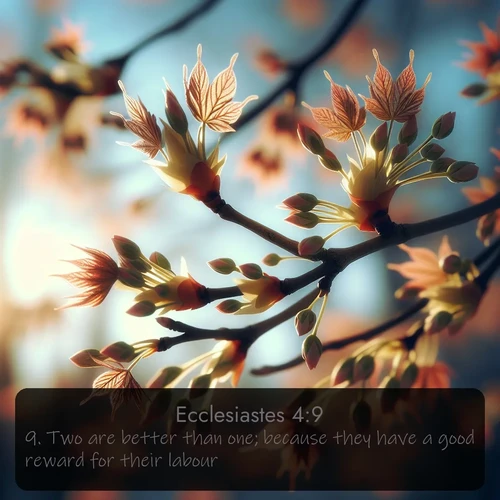Ecclesiastes 4:9 plusieurs versions / traductions
English Bible Translations
9. Two are better than one; because they have a good reward for their labour.
9. Two are better than one, because they have a good reward for their work.
9. Two are better than one; because they have a good reward for their labour.
9. Two are better than one; because they have a good reward for their labor.
9. The two [are] better than the one, in that they have a good reward by their labour.
German Bible Translations
9. So ist's ja besser zwei als eins; denn sie genießen doch ihrer Arbeit wohl.
9. Es ist besser, man sei zu zweien, als allein; denn der Arbeitslohn fällt um so besser aus.
French Bible Translations
9. Il vaut mieux être deux que tout seul, parce qu'à deux on retire un bon profit du travail.
9. Deux valent mieux qu’un, parce qu’ils retirent un bon salaire de leur travail.
9. Deux valent mieux qu'un, parce qu'ils retirent un bon salaire de leur travail.
9. Deux valent mieux qu'un; car ils ont un meilleur salaire de leur travail.
9. Deux valent mieux qu'un; parce qu'il y a pour eux un bon salaire de leur travail.
Versions with Strong Codes
Ecclesiastes 4 / KJV_Strong9.
Strong Code definitions
H8147 shnayim shen-ah'-yim dual of H8145; feminine shttayim {shet-tah'-yim}; two; also twelfth, + twelve, + twenty (sixscore) thousand, twice, two. see H8145
H2896 towb tobe from H2895; good (as an adjective) in the widest sense; used likewise as a noun, both in the masculine and the feminine, the singular and the plural (good, a good or good thing, agood man or woman; the good, goods or good things, good men or women), also as an adverb (well):--beautiful, best, better, bountiful, cheerful, at ease, X fair (word), (be in) favour,fine, glad, good (deed, -lier, -liest, -ly, -ness, -s), graciously, joyful, kindly, kindness, liketh (best), loving, merry, X most, pleasant, + pleaseth, pleasure, precious, prosperity, ready, sweet, wealth, welfare, (be) well((-favoured)). see H2895
H4480 min min or minniy {min-nee'}; or minney (constructive plural){min-nay'}; (Isaiah 30:11); for H4482; properly, a part of; hence (prepositionally), from or out of in many senses (as follows):--above, after, among, at, because of, by (reason of), from (among), in, X neither, X nor, (out) of, over, since, X then, through, X whether, with.see H4482
H259 'echad ekh-awd' a numeral from H258; properly, united, i.e. one; or (as an ordinal) first:--a, alike, alone, altogether, and,any(-thing), apiece, a certain, (dai-)ly, each (one), +eleven, every, few, first, + highway, a man, once, one, only, other, some, together,see H258
H834 'aher ash-er' a primitive relative pronoun (of every gender and number); who, which, what, that; also (as an adverb and a conjunction) when, where, how, because, in order that, etc.:--X after, X alike, as (soon as), because, X every, for, + forasmuch, + from whence, + how(-soever), X if, (so) that ((thing) which, wherein), X though, + until, + whatsoever, when, where(+ -as, -in, -of, -on, -soever, -with), which, whilst, + whither(- soever), who(-m, -soever, -se). As it isindeclinable, it is often accompanied by the personal pronoun expletively, used to show the connection.
H3426 yesh yaysh perhaps from an unused root meaning to stand out, or exist; entity; used adverbially or as a copula for the substantive verb (1961); there is or are (or any other form of the verb to be, as may suit the connection):--(there) are, (he, it, shall, there, there may, there shall, there should) be, thou do, had, hast, (which) hath, (I, shalt, that) have, (he, it, there) is, substance, it (there) was, (there) were, ye will, thou wilt, wouldest.see H1961
H2896 towb tobe from H2895; good (as an adjective) in the widest sense; used likewise as a noun, both in the masculine and the feminine, the singular and the plural (good, a good or good thing, agood man or woman; the good, goods or good things, good men or women), also as an adverb (well):--beautiful, best, better, bountiful, cheerful, at ease, X fair (word), (be in) favour,fine, glad, good (deed, -lier, -liest, -ly, -ness, -s), graciously, joyful, kindly, kindness, liketh (best), loving, merry, X most, pleasant, + pleaseth, pleasure, precious, prosperity, ready, sweet, wealth, welfare, (be) well((-favoured)). see H2895
H7939 sakar saw-kawr' from H7936; payment of contract; concretely, salary, fare, maintenance; by implication, compensation, benefit:--hire, price, reward(-ed), wages, worth.see H7936
H5999 `amal aw-mawl' from H5998; toil, i.e. wearing effort; hence, worry, wheth. of body or mind:--grievance(-vousness), iniquity, labour, mischief, miserable(-sery), pain(-ful), perverseness, sorrow, toil, travail, trouble, wearisome, wickedness.see H5998
Prédications qui analysent les thèmes Ecclésiaste 4
Thèmes : Inutilité des efforts ; Solitude de l'homme ; Valeur de l'amitiéRelated Sermons discussing Ecclesiastes 4
Themes : Inutilité des efforts ; Solitude de l'homme ; Valeur de l'amitiésee also: Bible Key Verses ; KJV Bible Images, BBE Bible images

